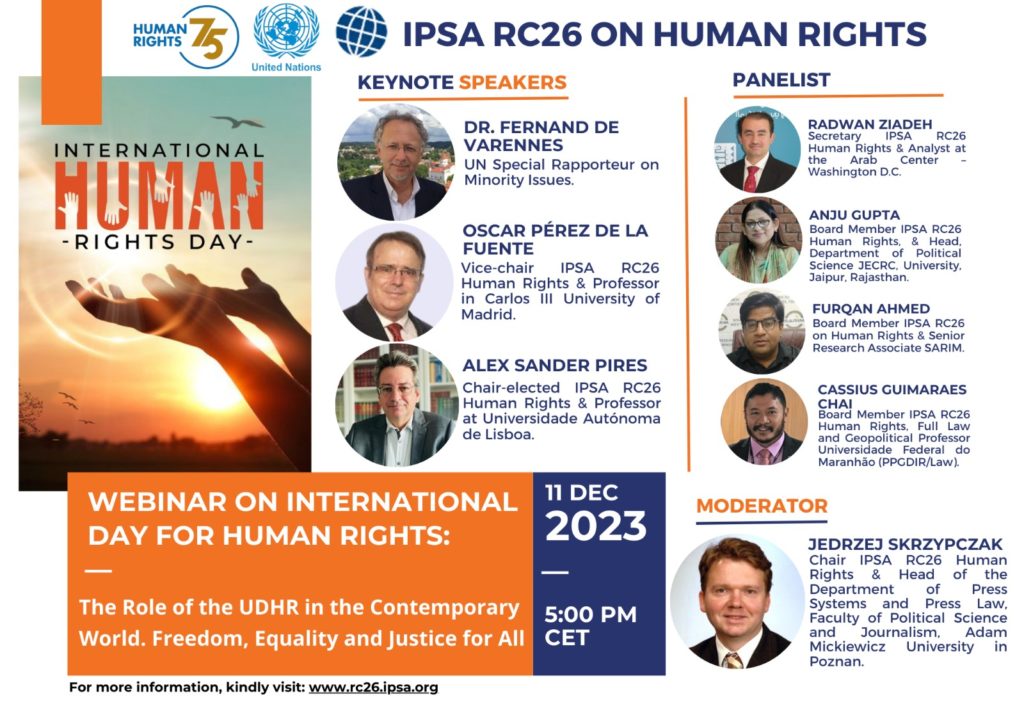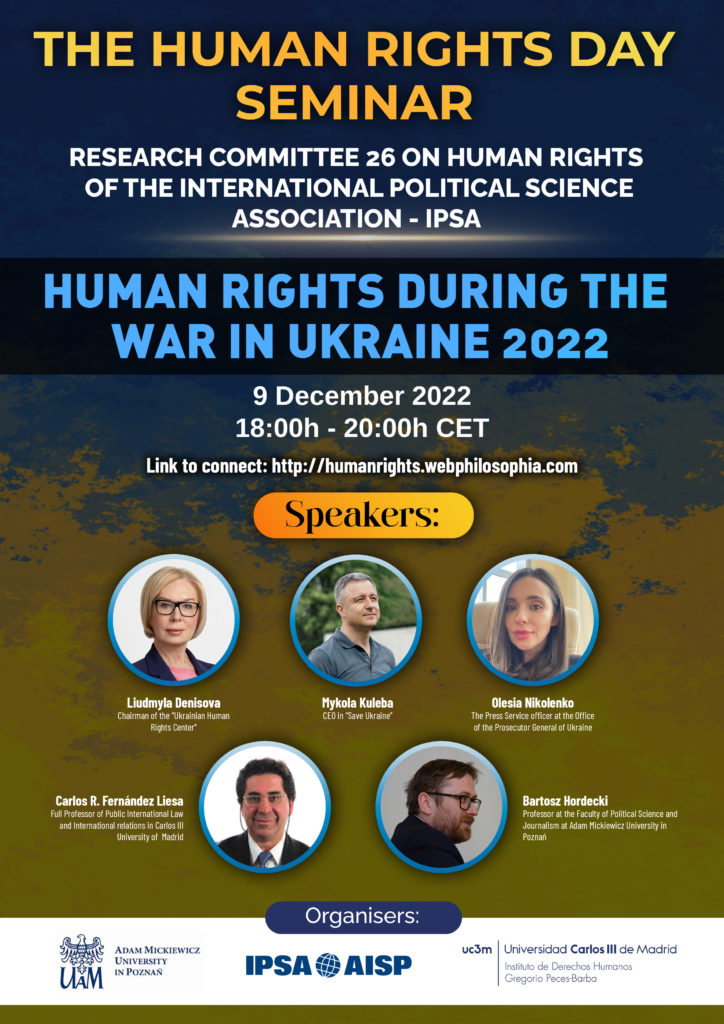Jedrzej Skrzypczak
Adam Mickiewicz University in Poznan, Poland
- Introduction
Freedom of expression is guaranteed both in the legal order of the Council of Europe (the European Convention on Human Rights) and the European Union (Article 11 of the Chart of Fundamental Rights of the European Union No 2012 / C 326/02). Still, it should be emphasised that this freedom is not unlimited. However, as it was indicated in p. 2 of Article 10 ECHR, “The exercise of these freedoms since it carries with it duties and responsibilities, may be subject to such formalities, conditions, restrictions or penalties as are prescribed by law and are necessary for a democratic society, among other in the interests of national security, territorial integrity or public safety /../”.
- Freedom of speech in times of war
Indeed, the state of war is one of the reasons why Freedom Of Expression may be limited. As US Supreme Court declared in Schenck v. the United States in 1919, “when a nation is at war, many things that might be said in times of peace are such a hindrance to its effort that their utterance will not be endured so long as men fight, and that no Court could regard them as protected by any constitutional right. Additionally, the US Supreme Court declared that the government could restrict speech more in times of war than in times of peace”. (https://www.mtsu.edu/first-am additions/article/1597/free-speech-during-wartime)
As shown in the doctrine, “American history confirms that in times of war, freedom of speech suffers. Unfortunately, the understandable push for security and order has caused excess efforts at branding many who dissent as disloyal”. (https://www.mtsu.edu/first-amendment/article/1597/free-speech-during-wartime) We can indicate many such cases, not only in the history of the USA.
We can also point to a similar case recently also in the European Union. After Russia attacked Ukraine on 24 February, 2022, the European Union banned Russian broadcasting programmes on the territory of EU member states. As stated in COUNCIL REGULATION (EU) 2022/350 of 1 March, 2022, amending Regulation (EU) No 833/2014 concerning restrictive measures in view of Russia’s actions destabilising the situation in Ukraine, “the Russian Federation has engaged in a systematic, international campaign of media manipulation and distortion of facts to enhance its strategy of destabilisation of its neighbouring countries and the Union and its Member States. In particular, the propaganda has repeatedly and consistently targeted European political parties, especially during election periods, as well as targeting civil society, asylum seekers, Russian ethnic minorities, gender minorities, and the functioning of democratic institutions in the Union and its Member States. To justify and support its aggression against Ukraine, the Russian Federation has engaged in continuous and concerted propaganda actions targeted at civil society in the Union and neighbouring countries, gravely distorting and manipulating facts. Those propaganda actions have been channelled through a number of media outlets under the permanent direct or indirect control of the leadership of the Russian Federation. Such actions constitute a significant and immediate threat to the Union’s public order and security. Given the gravity of the situation and response to Russia’s actions destabilising the situation in Ukraine, it is necessary, consistent with the fundamental rights and freedoms recognised in the Charter of Fundamental Rights, in particular with the right to freedom of expression and information as identified in Article 11 thereof, to introduce further restrictive measures to urgently suspend the broadcasting activities of such media outlets in the Union, or directed at the Union. /…/ According to Article 2f 1., “It shall be prohibited for operators to broadcast or to enable, facilitate, or otherwise contribute to the broadcast any content by the legal persons, entities or bodies listed in Annex XV (i.e. RT – Russia Today English, RT – Russia Today UK, RT – Russia Today Germany, RT – Russia Today France, RT – Russia Today Spanish, Sputnik), including through transmission or distribution by any means such as cable, satellite, IP-TV, internet service providers, internet video-sharing platforms or applications, whether new or pre-installed”. Due to this regulation, any broadcasting licence or authorisation, transmission, and distribution arrangement with the legal persons, entities, or bodies listed above shall be suspended.
National media market regulators made similar decisions in some European Union countries. For example, according to the Polish National Broadcasting Council Decision of February and March 2022, it was decided to remove Russian TV channels from the register of cable networks and satellite platforms. Cable operators had to remove some stations from the offer and satellite platforms from set-top boxes. Then Russian stations were removed from Canal+ and Orange’s offer. Pervyj Kanał (Channel One Russia) and Belarus 24 (TV Belarus) have joined the banned stations. (Read more at: https://www.wirtualnemedia.pl/artykul/krrit-rerezent-operatorow-sieci-kablowe-platformy-cyfrowe-pierwyj-kanal-bialorus-24;https://www.wirtualnemedia.pl/artykul/jak-odbierac-rosyjskie-kanaly-krrit-usuwa-sieci-kablowe-platformy-cyfrowe-russia-today-rossija-24-orange-polsat-box- canal-upc)
- Freedom of speech in Ukraine durin the war
At the beginning of this section, it should be emphasised that according to the world rankings of media freedom, Russia and Ukraine occupy a rather distant place. According to the Press Freedom Index of 2021, Ukraine was ranked 97th out of 180 countries and 106th in 2022. According to the same list, this position is better than Russia’s; in 2021, it was rated 150, and in 2022, 155 out of 180.
In the case of Ukraine, it can be assumed that her position will be even weaker next year. Certainly, a severe justification for such an unfavourable trend is the necessity to deal with the attack by the Russian Federation and the war. Many actions and legal acts were undertaken, de facto introducing war censorship.
It should be reminded here that according to the Decree of the President of Ukraine №152 / 2022 following Article 107 of the Constitution of Ukraine, the decision of the National Security and Defence Council of Ukraine, “On the implementation of a unified information policy under martial law”, of 18 March, 2022 was put into effect. As a result, President of Ukraine V. Zelensky introduced the unified information policy as a priority issue of national security, which is ensured by combining all national television channels, the broadcast content of which consists chiefly of information or information/analysis programmes on a single information platform for strategic communication – round-the-clock news Marathon Single News #UArazom”, “(see more: УКАЗ ПРЕЗИДЕНТА УКРАЇНИ №152/2022Про рішення Ради національної безпеки і оборони України від 18 березня 2022 року “Щодо реалізації єдиної інформаційної політики в умовах воєнного стану”, https://ua.interfax.com.ua/news/general/816002.html)
Several other worrying trends should be noted. However, not all cases can be justified by the war and the fight against the Russian invaders. They seem to have nothing to do with Russian propaganda and information warfare. The hostilities were only a pretext to eliminate TV broadcasters independent of the authorities from the public space. Examples include the case of Channel 5, “Pramyj”, and “Espresso”. The Ukrainian national regulator announced on 4 April, 2022, that it would prohibit broadcasting these TV channels on the T2 digital network. The sender appealed to the court against these decisions. Mychajło Podolak, the adviser to the head of the President’s Chancellery, shed some light on the reasons for this decision, stating that the channels mentioned above from the so-called Petro Poroshenko’s pools (Channel 5, Priamyj and Espresso) had been excluded from digital broadcasting because they were harmful due to the narcissism of the former Ukrainian president and political opponent of President Zelensky.
Another disturbing case was the attempt to exclude pro-Russian journalists from nationwide Ukrainian TV channels without any fair trial and independent court decisions. Ukrainian journalists and human rights organisations called for dismissing journalists who had previously played with the enemy’s rhetoric and had spread Kremlin propaganda for many years. This list includes journalists such as Vasyl Holovanov, Tigran Martirosyan, Natasha Vlashchenko, Tetiana Honcharova, Nazar Dovhyy, Volodymyr Poluyev, Anna Stepanets, Anastasia Dauhule. They were accused of promoting the Kremlin’s narrative about the alleged US control of Ukraine, “discrimination” of the Russian language, spreading propaganda about a “civil war” in the Donbas, and justifying the Russian occupation of Crimea. Some journalists also called for cleaning the Ukrainian media space from Russian agents. “Now we have the chance to clear out the Ukrainian media space and to set up an institute of reputation to protect Ukraine from repeating the story in the future”.( see https://imi.org.ua/en/news/the-media-community-calls-to-exclude-pro-russian-hosts-from-participating-in-national-telethons-i45534). “Media Group Ukraine”, i.e., the sender who employs these persons, stated that currently, it had no doubts about the pro-Ukrainian civic stance of the TV hosts mentioned, whom the media community called for excluding from national telethons because of their pro-Russian narratives. (see: https://imi.org.ua/en/news/media-group-ukraine-does-not-doubt-the-pro-ukrainian-stance-of-the-hosts-of-medvedchuk-s-tv-channels-i45607).
3a. The case of social media.
The resident of the Lviv region will be tried for posting a video on the social media TikTok featuring the movement of a column of the Armed Forces of Ukraine. A defendant (a 28-year-old man), in April 2022, posted a video on TikTok showing a column of military equipment on the move (the number and type of vehicles). The prosecutors have filed an indictment for the unauthorised distribution of information about the movement of the Armed Forces under martial law (Part 2 of Article 114-2 of the Criminal Code of Ukraine).(see: Reporters have been killed and injured while reporting on the war. RFE/RL’s Vira Hyrych, who died in a Russian missile strike in Kyiv on 28 April, https://www.rferl.org/a/world-press-freedom-index-rsf-russia-ukraine/31831712.html
- Freedom of media in Russia
In Russia, for quite some time now, the government has taken virtually total control of news and information by introducing extensive censorship, blocking the media, and prosecuting non-compliant journalists, forcing many to emigrate. As mentioned, the country fell five places from 150 in the ranking in 2021 to 155 in 2022 when the Reporters Without Borders (RSF) lowered Russia’s rating for repression of journalists reporting protests in support of the Kremlin’s criticism of Alexei Navalny and the tightening of its media law as “foreign agents”.
In Russia, after the start of the war with Ukraine, military censorship was introduced: at that time, more than 3,000 websites were closed in the country – news publications, social networks, public organisations, trade and IT companies. Access to most websites was restricted at the request of the General Prosecutor’s Office of the Russian Federation. In March 2022, the Office demanded that Twitter, Facebook and Instagram be blocked. Their owner – the Meta company – was recognised as an “extremist”. The list of banned resources also includes many media sites. Some, such as Meduza and Mediazona, were even blocked twice based on various decisions of the General Prosecutor’s Office. (see: https://mailbd.net/news/3000-websites-blocked-in-russia-after-the-start-of-the-war-with-ukraine-news-from-germany-about-russia-dw-3356/)
Additionally, in March 2022, Russia passed two laws that criminalise all independent war reports and protests against the war, with penalties of up to 15 years in prison. The law prohibits spreading “fake news” about Russian armed forces, calling for an end to their deployment. On 23 March, the Russian parliament adopted a decree effectively extending the ban on criticising the armed forces to the one condemning any actions taken by the Russian authorities abroad. The amendments expand the provisions on “false information” and “discredit” to government bodies such as the Russian Guard (currently involved in hostilities in Ukraine), embassies, consulates and emergency services. The penalties are similar to those laid down in the original law criminalising “false information” and “discrediting” the Russian armed forces. As a result, disseminating, for example, information in social media that Russia is waging war in Ukraine and not a “special military operation”, as Putin calls it, is punishable by imprisonment of up to 15 years.










